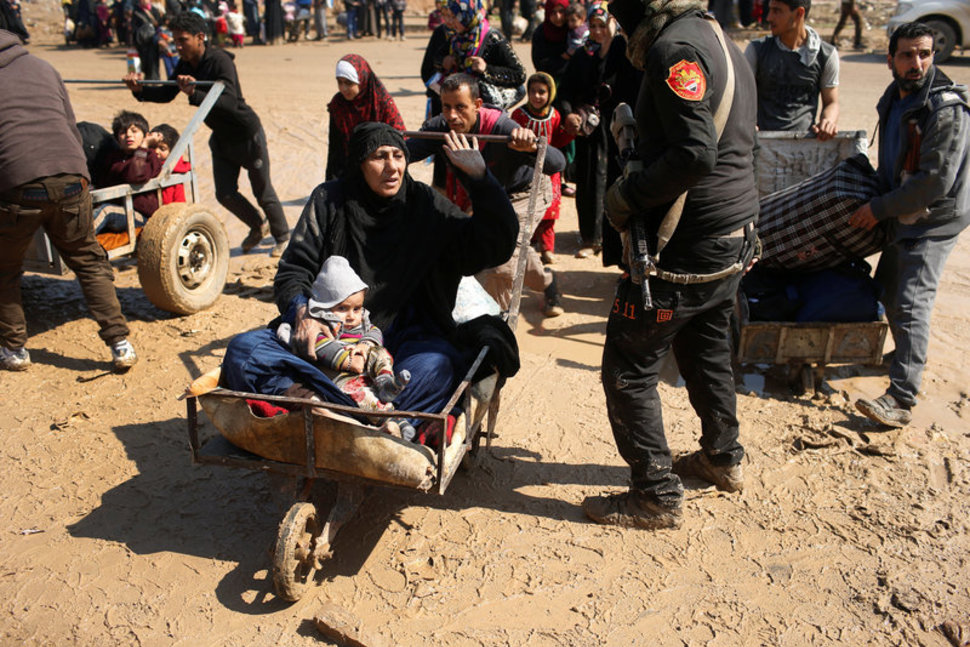Mosul- Crammed together in the back of a truck, dozens of people wear expressions of relief on their tired faces as the truck pulls away to start the final stage of their escape from war-torn west Mosul.
They will head for one of several camps set up around the Iraqi city to house the displaced. They will receive food, blankets and aid.
Among the displaced is Yassir Ahmed, 35, who carries a young child in his arms as he walks, his back bent from fatigue. Others drag metal carts loaded with children or the elderly, their faces lined with stress and fatigue.
In suitcases and plastic bags, they carry the few belongings they were able to grab as they fled. Some are empty handed.
ISIS “detained us for 15 days and wouldn’t let us leave,” says a man in a grey tracksuit stained with mud.
“Last night, they retreated under pressure from the security forces. We escaped at about six o’clock this morning,” he tells Agence France Presse.
A rumble of mortar fire resonates in the distance as hundreds of people trudge up a rain-drenched street under a heavy grey sky of smoke and clouds.
Staying in western Mosul meant living without food, without water and in constant fear of the jihadists.
“There were snipers on a warehouse, shooting at people,” says 27-year-old Adel Abdul Karim.
After hours on foot, the escapees reach a bus station on the outskirts of the city, where they wait to board buses and army trucks.
But the situation borders on chaos. Desperate to leave Mosul, the crowd rushes towards the vehicles, elbowing for a place.
There are cries and tears. Some try to negotiate, others shout angrily. A woman in a black niqab veil falls into the mud after vainly trying to force her way through.
“We are dealing with women and children first, but we have a hard time managing things,” said a member of the Iraqi security forces. “Look! There are so many people!”
Bilal Abduljabbar, who clambers onto the back of an Iraqi army truck with his two teenage children, says “Where we came from, there was no water and no food, just fighting.”
“And where we’re going, there’s no future,” the 43-year-old tells AFP.
Amid the suffering of people in West Mosul, the city’s eastern part is coming back to life. In the few weeks since Iraqi forces drove ISIS from this side of the city, markets have opened and bulldozers have begun to clear the debris left by battle.
Stalls spilling onto the street in between collapsed buildings display fruit and vegetables, and vendors play recordings advertising SIM cards and mobile phones — use of which was punishable by death under ISIS.
But, according to Reuters, everywhere are reminders of the pain the city has endured and the irreversible physical and psychological damage caused to Mosul, the Iraqi stronghold of the ultra-violent jihadist group for nearly three years.
The dire situation in east Mosul shows that once jihadist rule has ended, the city will likely face a slow recovery at best.
“This war has destroyed everything,” Mohammed Abdullah, a 50-year-old day laborer said, standing with several other men outside a covered central market.
“Every day we look for work but there’s nothing — maybe one day a week, for which we earn around 10,000 dinars ($8.50).
“There’s no government aid. All I have left is my citizenship,” he said.
Much manual labor work, organized by the town hall, involves clearing up debris and rubble-littered streets.
Outside the Nabi Yunus shrine, which ISIS blew up in 2014, residents of east and west Mosul shoveled detritus onto a tractor-drawn skip.
“Work is very occasional but we’re glad to be out doing it, and free of ISIS,” said 30-year-old Waddah.
Displaced from western Mosul by fighting, Waddah had come with 14 other relatives to live at his cousin’s home.
“It’s cramped and there’s no electricity or running water,” he said.
At the market, some shop-owners ran generators to light their stores. Business had somewhat picked up, they said.
One vendor displayed clothes he said he had not been able to sell under ISIS, such as full-length trousers rather than ankle-length ones required.
Goldsmith Moayed Sayegh, 54, said business was back to about 40 percent.
“You can see there’s life in the market now, but the problem is infrastructure and security,” Sayegh said. “There are still mortar shells being fired across the river by ISIS and landing in eastern Mosul. Today one hit a school building and a child was killed.”
The physical damage is always visible and residents are still in danger from spillovers of fighting.
But for some, it is the psychological scars that run deepest.
During their rule, ISIS militants executed the mother of Loay Jassem, now 21, for being an MP.
“They executed so many politicians and police, people who worked for the government,” Jassem said, gathered with friends at a market stall.
The militants shot his mother Ibtisam Jaber in the head in front of his younger sister, who was six at the time, Jassem said.
The boys said they had also seen ISIS kill a disabled child.
Those still young enough wanted to go back to school, having missed more than two years of education.
Other youngsters were more desperate for money. A young man standing on the city outskirts watched a private
company de-mine a patch of land thought to be booby-trapped by ISIS as they withdrew.
“Who’s the boss here? I need work,” he said.
